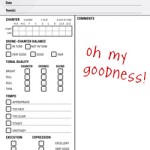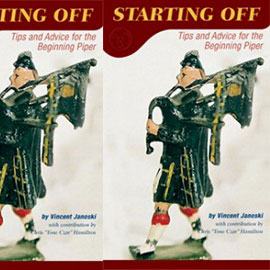Solo Competing: How to properly present yourself to a judge

Any of you who knew me as I progressed through the different solo grades, or have seen me during early-season events with Oran Mor, will rightfully identify the irony of me writing this post. That being said, my general clueless-ness has forced me to consciously evaluate my presentation, and, generally speaking, when it counts I do…. OK. Also, having now judged many contests, I have seen just how much the presentation can have an effect on the overall impression the judge has of you.
Here are several big things to consider.
Appear confident, and relaxed. This seems like a no-brainer, but it’s important. If you seem all worked up, the judge will expect an all-worked-up performance. The opposite will also be true. If you seem relaxed and confident, the judge will be all ears for a relaxed and confident performance.
When you talk to the judge, keep your voice tame. When the adrenaline is pumping, it’s all to easy to essentially shout at the judge! I have learned this the hard way a time or two. I would feel great about my performance, and then audience members would say “Dude, you like, shouted at the judge.” Ha! Then I got my sheet and could see that my performance wasn’t so great after all. Or… did my poor first impression cause the judge to (consciously or unconsciously) seek out the imperfections in my performance, rather than seeking the good things?
Be Dressed Well. You don’t have to be decked out in leopard skin and feather bonnet, but dress the part. Tuck the shirt in. Even out your hose. Wear your Glengarry! Jacket, or no jacket? I would say that, unless you’re at the Northern Meeting or something, wear what’s comfortable. Nowadays, a vest is more than enough to look sharp, without being totally sweaty and uncomfortable as you play. As a judge, on a 90-degree day, I have to say that a part of me thinks “this player is trying a bit too hard” when they’re wearing the jacket on top of a vest, sweating their guts out. Looking good is important, but it should never overly get in the way of music making. Just a personal opinion.
Make your Tune-up Routine Musical! Use good warm up tunes. Don’t be frantic. Use High A when you reach up to tune your drones, rather than less harmonic notes like false-D or false-E or false-F (they’re false because your bottom hand isn’t on the chanter)! Also, this may seem weird but: try to actually get your pipes in tune before you start. There are so many players who mess with their drones for the ceremonial 3 minutes, and get nothing accomplished!
Before you leave, acknowledge the judge. If you’re a military-type piper, give a salute. If you’re a civilian piper like myself, give a modest bow and say “Thank you.” Try to avoid moaning in agony or cursing audibly. This happens more than you think. Swearing in front of the judge = bad taste. Even if your performance went poorly, keep it classy until you’re out of sight. Think about it—the judge is more likely to forgive flaws with your performance if you show that you really care, and that you have enough respect for the judge to bow or salute.
So, that’s a good start on this topic. Tune into Bagpipe Nation this week to chat about this more!
-
Joe Korber
 Pipehacker
Pipehacker








